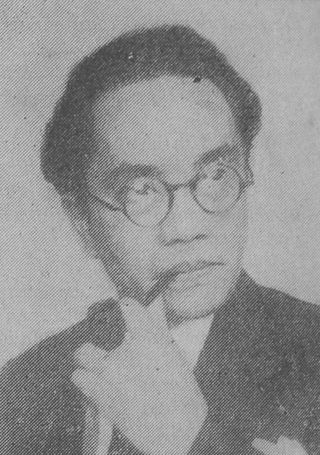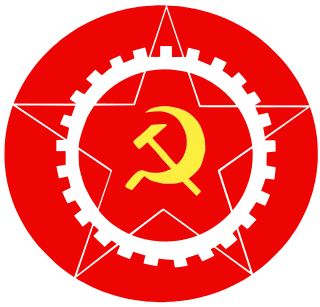Related Research Articles

The Socialist Party of Indonesia was a political party in Indonesia from 1948 until 1960, when it was banned by President Sukarno.

Sutan Sjahrir was an Indonesian politician and revolutionary independence leader who served as the first Prime Minister of Indonesia from 1945 until 1947. Previously, he was a key Indonesian nationalist organizer in the 1930s and 1940s. Unlike some of his colleagues, he did not support the Japanese during the Japanese occupation and fought in the resistance against them. He was considered to be an idealist and an intellectual.

Amir Sjarifuddin Harahap was an Indonesian politician and journalist who served as the second prime minister of Indonesia from 1947 until 1948. A major leader of the left wing during the Indonesian National Revolution, he previously served as Minister of Information from 1945 until 1946 and Minister of Defense from 1945 until 1948. Amir was born into the Sumatran aristocracy and was educated at Leiden University. At Leiden, he became a member of the board of the Gymnasium student association in Haarlem and was involved in the Batak student organization Jong Batak. He returned to Indonesia due to family troubles but continued his education at the Rechts Hogeschool in Batavia.

The Prime Minister of the Republic of Indonesia was a political office in Indonesia which existed from 1945 until 1966. During this period, the prime minister was in charge of the cabinet of Indonesia, one of the three branches of government along with the House of Representatives and the president. Following his 1959 decree, President Sukarno assumed the role and powers of prime minister until his resignation in 1966.

The First Sjahrir Cabinet was the second Indonesian cabinet, named after the prime minister. It served from November 1945 to March 1946.

The Second Sjahrir Cabinet was the third Indonesian cabinet and the second formed by Sutan Sjahrir. It served from March to October 1946.

The Third Sjahrir Cabinet was the fourth Indonesian cabinet. It served from October 1946 to July 1947, when it fell due to disagreements related to the implementation of the Linggadjati Agreement and subsequent negotiations with the Dutch.

The First Amir Sjarifuddin Cabinet was the fifth Indonesian cabinet and was in office from 3 July to 11 November 1947.
The Socialist People's Party was a political party in Indonesia. It was founded in Djakarta in 1945, and Sutan Sjahrir was the chairman of the party. In December 1945, at a meeting in Cheribon, the party merged with the Socialist Party of Indonesia, forming the Socialist Party with Sjahrir as chairman.
The Socialist Party was socialist political party in Indonesia which existed from 1945 to 1948. The party was founded as a merger between the Socialist People's Party (Paras) of Prime Minister Sutan Sjahrir and Socialist Party of Indonesia (Parsi) of Defence Minister Amir Sjarifuddin. Sjahrir became chairman of the unified party, whilst Sjarifuddin became vice-chairman.

The Labour Party of Indonesia was a political party in Indonesia.

The Labour Party was a political party in Indonesia. It was formed on 25 December 1949 by a group of former Labour Party of Indonesia (PBI) members, who had disagreed with the merger of PBI into the Communist Party of Indonesia.
Vice Presidential Edict No. X was an edict issued by Indonesian Vice-president Mohammad Hatta on 16 October 1945 which gave the Central Indonesian National Committee (KNIP), initially a purely advisory body, the authority to become the legislative body of the government.

The Central All-Indonesian Workers Organization was the largest trade union federation in Indonesia. Founded during the period of the country's independence in the late 1940s, the federation grew rapidly in the 1950s. It was initially formed with loose connections to the Communist Party of Indonesia (PKI) and with members from other parties, but over time, the PKI became dominant in the organisation. With the introduction of President Sukarno's guided democracy in the late 1950s, SOBSI was formally recognised and given a place in the national decision-making structures. In the 1960s, SOBSI came into conflict with the Army, whose officers controlled the country's state enterprises. After the 1965 coup that subsequently produced Suharto's New Order regime, SOBSI was declared illegal, its members killed and imprisoned and most of the leadership executed.

Soedjatmoko, more colloquially referred to as Bung Koko, was an Indonesian intellectual, diplomat, and politician. He was born into a noble father and mother in Sawahlunto, West Sumatra. After finishing his primary education, he went to Batavia to study medicine; in the city's slums, he saw much poverty, which became an academic interest later in life. After being expelled from medical school by the Japanese in 1943 for his political activities, Soedjatmoko moved to Surakarta and practiced medicine with his father. In 1947, after Indonesia proclaimed its independence, Soedjatmoko and two other youths were deployed to Lake Success, New York, to represent Indonesia at the United Nations (UN). They helped secure international recognition of the country's sovereignty.

Major general TNI (Tit.) Dr. Adnan Kapau Gani or commonly abbreviated as A.K. Gani was an Indonesian doctor, politician, actor and military figure. He served as Deputy Prime Minister in the Cabinet of Amir Sjarifuddin I and the Cabinet of Amir Sjarifuddin II.

Wikana was an Indonesian minister and independence leader. He was one of the youths who forced Sukarno and Hatta to declare independence immediately after the surrender of the Japanese. He was the first Indonesian Minister of Youth and Sport. He was a member of the Indonesian Communist Party. Sometime after the 1965 coup d'état attempt, he was arrested and went missing. It is supposed that he was one of the assassinated in the Indonesian mass killings of 1965–66.

Brig. Gen. Daan Jahja or Daan Yahya was an Indonesian military officer who was the Chief of Staff of the Siliwangi Division in 1948 and the Military Governor of Jakarta from 1949 to 1950.
Lintong Mulia Sitorus, in pre-1948 spelling Lintong Moelia Sitoroes, was an Indonesian intellectual, writer, translator, lawyer, and Socialist Party of Indonesia politician. He was a key follower of the independent-minded Indonesian nationalist Sutan Sjahrir in the 1940s and 1950s.
The Indonesian People's Movement, better known as Gerindo, was a left-wing and nationalist political party in the Dutch East Indies which existed from 1937 to 1942. It had modest goals and was largely cooperative to the colonial administration. More strongly anti-fascist than anti-colonialist, the party sought to support the colonial government in opposing fascism, especially Japanese fascism.
References
- 1 2 Mrázek, Rudolf. Sjahrir: Politics and Exile in Indonesia . Studies on Southeast Asia, no. 14. Ithaca, N.Y.: Southeast Asia Program, Cornell University, 1994. pp. 284-285
- 1 2 Rose, Saul. Socialism in Southern Asia. London: Oxford University Press, 1959. pp. 147, 1952
- ↑ Legge, J. D. Intellectuals and Nationalism in Indonesia: A Study of the Following Recruited by Sutan Sjahrir in Occupation Jakarta . [Ithaca, N.Y.]: Cornell Modern Indonesia Project Publications, 1988. p. 114
- ↑ Legge, J. D. Intellectuals and Nationalism in Indonesia: A Study of the Following Recruited by Sutan Sjahrir in Occupation Jakarta . [Ithaca, N.Y.]: Cornell Modern Indonesia Project Publications, 1988. p. 121
- ↑ Rose, Saul. Socialism in Southern Asia. London: Oxford University Press, 1959. p. 152
- ↑ Legge, J. D. Intellectuals and Nationalism in Indonesia: A Study of the Following Recruited by Sutan Sjahrir in Occupation Jakarta . [Ithaca, N.Y.]: Cornell Modern Indonesia Project Publications, 1988. p. 115